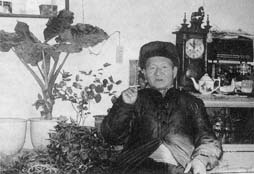|
 |
|
Cui Zhenyou (HUANG WEI) |
It was proclaimed that China had entered the communist society ahead of schedule, and everyone could have free meals at canteens of collectives. Then, almost all households in China stopped cooking, and they presented their iron pots and all other utensils and furniture that contained iron to steel works to make steel.
These ignorant actions that prevailed in China in the mid to late 1950s are vividly depicted in the film Live, directed by Zhang Yimou, one of the most famous Chinese directors, which won a grand prize at the Cannes Movie Festival. These funny scenes have actually become deeply rooted memories in the life of Cui Zhenyou.
"At first we had dumplings (best food for most Chinese families in the past) and noodles, then corn and sweet potatoes. Finally, we ate up all the grain reserves," Cui recalls. "In 1958, our village reaped nothing due to a natural disaster. We had to eat tree bark and wild herbs.
"I didn't feel at ease from the outset. Everybody merely ate and engaged in 'revolution', but nobody cared about the crops in the fields. How could we farmers leave our land? How could we stop farming?"
Since 1932, Cui has been living in Beitaixia Village of Yanqi Town in Beijing's suburban Huairou County. Before, his forefathers had lived there for more than 100 years. The Cui family is the oldest in the village, and Cui Zhenyou is the village's oldest resident.
Cui clearly remembers that before 1949, his father had taken him fleeing from this land many times, to escape from wars, pestilence or famine. However, every time when the crisis was over, they would come back no matter how far they had traveled. "My father told me that this is where our home is, and where our roots are. No trees can leave their roots even though they grow dozens of meters high."
Cui's father, who had lived all his life on his small infertile land, did not live long enough to witness the establishment of New China, to see poor farmers become masters of the country, and to see the earthshaking changes in their lives.
Cui had no opportunities to attend regular schools. He only learned to read in literacy classes run by the Government after 1949. "I no longer need to flee from wars and chaos, life becomes better and better, and we have surplus grain at home." That's what this old man feels about his life in the past decades, while he could hardly comprehend the ups and downs experienced by the Communist Party of China after it took power. Nor does he know that what remains deep in his memories had been deemed as an ultra-Leftist trend in the history of the Party and been redressed.
"Greater changes have taken place in my life over the last 20 years," Cui says. Furnishings in his home were added with a radio and armoires, and then with a color television. All residences in the village now have access to drinking water. Cui's old houses have been renovated several times. Facing south and with broad glass windows, these brick houses contain one granary that stores several thousand kilograms of wheat and corn.
"Another change is that farmlands in the village become less and less," Cui says. Cui's hometown, Yanqi Town, is located near Yanqihu Lake, a major scenic site in Beijing suburbs. The development of the tourist site and construction of express ways have occupied many farmfields. This time Cui feels no worry , unlike he did in the past, because Cui and other villagers regularly receive a fixed amount of cash subsidies from the Government for the occupation of farmland, which are sufficient for them to support themselves.
"But I'll never leave farmland," says Cui firmly. Cui has six sons and one daughter, who all have their own families living separately from Cui. Contracting a piece of farmland with the subsidies from the Government, Cui and his wife, who is one year younger than him, continue their life of farming. Grain output is more than enough for the needs of the couple. They maintain their former lifestyle by raising pigs and donkeys in the courtyard of their home.
Cui says he was, is and will be a farmer in this passing century or in the next century, no matter how much the times change.
"In the past, I often heard older people say that the aged should not worry about their future. Now I won't think about tomorrow, and it seems I don't need to." He feels safe because "my life is so peaceful and well-off. He says he will live on this land until the end of his life. | 
